| Главная » Файлы » Jewish Atlántida. Mystery of the Lost Tribes » PASHTINS |
Jewish Atlántida - Pashtuns
| 14.11.2012, 11:57 | |
Amir Sher Ali Khan is sitting with Prince Abdullah Jan and the Afghan Sardars in 1869
(Wikipedia)
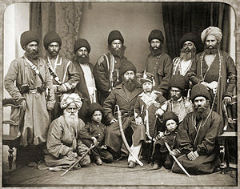 From an antiquity to the Middle Ages Where are the Lost Tribes? According to Kings I, they stayed beyond the Euphrates river. However today nobody can tell with accuracy where the borders of the Assyrian empire passed, and it is logical to assume, that the Tribes were settled beyond its boundaries. Explorers name the ancient cities of Media (Medes) (today's Iraq and Iran) as a possible location. The Bible records: "The king of Assyria carried the sons of Israel away to Assyria, and put them in Halah, by Habor, the River of Gozan, and in the cities of the Medes" (Kings II 18:11) According to Saadia Gaon, "The River of Gozan" is to the north from city of Balach in northern Afghanistan. Today this river is known as the Amu Darya, and it divides Tajikistan and Afghanistan. Habor lay on the pass between Afghanistan and Pakistan and its name today is Peshawar. "Hara” is the city of Harat near the Persian border. It is the third city in size in Afghanistan. However according to other sources, whereabouts of the Lost Tribes should lie further away from the borders of Assyrian empire. In the tenth century Eldad-Ha-Dani, the traveler from a certain Jewish community in East Africa, made a trip to Asia. He found the tribes of Reuben beyond Euphrates and the "mountains of Paran", which as he writes, "live in peace", and speak Persian and Hebrew. In the twelfth century another Jewish traveler, Benjamin of Tudela, made a thirteen-year journey across Greece, Asia, and Northern Africa. Having come back, he wrote that deep inside the Asian continent there were Jewish tribes descending from the Lost Tribes of Israel. He wrote that in the Persian province of Nishapur, he met representatives of the tribes of Dan, Asher, Zebulun and Naptali. All these tribes were perfectly informed about their Jewish origin. They were governed by a certain Prince Joseph of Markala. Benjamin of Tudela maintained that there were also the tribes of Reuben, Gad and Manasseh in Khaibar (Habor), also a province of Persia. Historic records show, that in the sixteenth century a man named David Rubeni emerged in Europe, who claimed to be the prince of a Jewish state in Africa, and the ambassador of Yosef, the king of Khaibar (Habor), a powerful Jewish empire in the depth of Asia. He offered king Juan of Portugal and to the Vatican three hundred thousand soldiers, ready to attack the Turkish army from the South and the East, and requested artillery support. The Pope and the king of Portugal took favorably to him, but soon thereafter, Portuguese defeated the Turkish fleet, and the Turkish threat diminished, and Rubeni’s became irrelevant. He died in prison in Portugal. Priest Monstrat (XV century), traveled across Northern India, wrote: "All the inhabitants of this area who have been living here since ancient times can trace their ancestry, according to their race and their customs, to the Jews; their features, their general physical appearance and clothing, and their way of conducting business, all show that they are similar to the Jews in Europe” (V.I.Fishel – "Jews and Judaism in Mogol Law”). Who now inhabits these lands? The answer would shock anyone. The lost Israeli tribes (or, at least a part of them) are Pashtuns. The same Pashtuns who have been notoriously famous for their fearlessness in battles against anyone who tried to invade Afghanistan: Great Moguls, the English Empire in the nineteenth century, and in the twentieth century, Russia. Today, the Pashtuns comprise the nucleus of the fanatical Taliban. The Pashtuns include 60 tribes and 400 clans, Their number makes more than 45 million, they are concentrated mainly in the mountain areas of Afghanistan and Pakistan, but also live in Northern India, in particular, in Kashmir. The Arabian chronicles Map of Afghanistan and Pakistan showing the
predominant Pashtun areas in green
(Author- Lord Mota, Wikipedia)
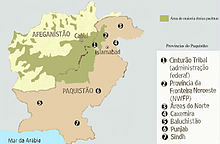 Though it looks extremely strange, this version is directly confirmed by the Arabian chronicles, according to which, King Saul had son Jeremiah (he is not mentioned in the Jewish sacred books). Jeremiah in turn had son by name "Afghana", whose descendants many centuries later, have moved to present day Afghanistan. When Arabs came to this place, their military leader Khalid ibn Walid met the head of the Jewish tribes Kish/Kash who was a direct descendent of Afghana. Though it looks extremely strange, this version is directly confirmed by the Arabian chronicles, according to which, King Saul had son Jeremiah (he is not mentioned in the Jewish sacred books). Jeremiah in turn had son by name "Afghana", whose descendants many centuries later, have moved to present day Afghanistan. When Arabs came to this place, their military leader Khalid ibn Walid met the head of the Jewish tribes Kish/Kash who was a direct descendent of Afghana. Kish, convinced by the reasoning of Khalid ibn Walid, accepted Islam and took for himself the Muslim name Abdul-Rashid (Servant of the Mighty) under which he became famous as a commander, and a favorite of Prophet Mohammed. The head of Ahmadia movement Hazrat Mirza Ghulam quotes ancient Arabian and Persian authors who claimed, that Mohammed gave Kish the name "Pathan" (Pashtun), which in Syrian means "the leader". This name became generic for all tribes under Kish’s rule. Descendants of Talibs are proud of their origin from Abdul-Rashid. Many Arabian chronicles specify the place and time of settling of the Afghan descendants. The oldest written reference we find is "Hudud-al-Alam”. Written in 982AD by an Arab Geographer, it clearly states that Pathans are Bani Israel. "The most ancient manuscript "Rauza-ul-Bab Twarikh-ul-Akbar wak-Ansab” ("The Garden of the Learned”) by Abu Suleman Daud (717 AH) …has traced the genealogies of the Afghan tribes right up to King Saul. …In his "Mirat-ul-Alam" ("the Mirror of the World") Bukhwar Khan gives an account of the journeys of the Afghans from the Holy Land to Ghor, Ghazni, Kabul and other places of Afghanistan and proves that the Afghans are the descendants of Israel through King Saul, - wrote India Jew Joshua Benjamin in his book "Mystery of the Lost Tribes”. - Some authors, such as Syed Jalal-ud-Din Afghani and Syad Abdul Jabbar Shah, the ex-ruler of Swat, deserve special mention. The two authors have given genealogies of different Afghan tribes right up to King Saul and conclude that the Afghans represent the Lost Tribes of Israel”. From travel notes of travelers and diplomats Pashtun leaders (photos of Dr. Navras Jaat Aafreedi) 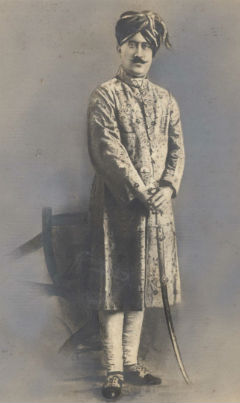 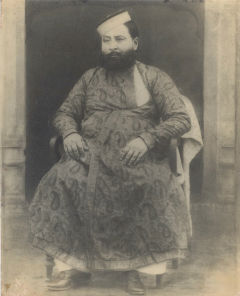 In XIX century there were numerous additional evidences in support of this version. They came from European travelers, archeologists, researchers and representatives of the British military authorities. In XIX century there were numerous additional evidences in support of this version. They came from European travelers, archeologists, researchers and representatives of the British military authorities. In the "Travel to Bukhara" (1835), Sir Alexander Brunes wrote, that Afghans name themselves often "Bani Israel" ("Sons of Israel"). Brunes, told about a legend according to which Jews were settled in the province of Ghor near Bamiyan, and started calling this place Afghan, after the king from whom they descended. He also mentions the story of Kish. In 1858, another English researcher J.P.Ferrier published the book "History of Afghanistan" in which he insisted without a shadow of doubt that present Afghans originate from the Ten Tribes of Israel. He mentioned an interesting fact that when Nadir Shah on his way to a campaign to conquer India stopped at Peshawar, the head of the local tribe Yusuf Zyes (Sons of Joseph) presented him with sacred texts written in Hebrew. Jews serving in the army of Nadir Shah recognized the authenticity of these religious texts. George Moore published his famous work The Lost Tribes in 1861, in which he mentioned the striking fact that the Lost Tribes are the ancestors of the Afghans. He wrote following: "And we find that the very natural character of Israel reappear in all its life and reality in countries where people call themselves Bani Israel and universally claim to be the descendants of the Lost Tribes. The nomenclature of their tribes and districts, both in ancient Geography, and at the present day, confirms this universal natural tradition. Lastly, we have the route of the Israelites from Media to Afghanistan and India marked by a series of intermediate stations bearing the names of several of the tribes and clearly indicating the stages of their long and arduous journey”. This legend is also mentioned in the memoirs of the British ambassador to Persia John Malkolm (1801). Thomas Ledlie wrote an article in the «Calcutta Review», January, 1898: "The Europeans always confuse things, when they consider the fact that the Afghans call themselves Bani Israel and yet reject their Jewish descent. Indeed, the Afghans discard the very idea of any descent from the Jews. They, however, yet claim themselves to be of Bani Israel". Joshua Benjamin in his book "Mystery of the Lost Tribes” told the story of Shalom Dadesh, who was born in Herat and accompanied a group of the Jews from Afghanistan, passing through Peshawar: "On my way to Israel I went through Peshawar and at the border on of the guards stopped me for a security check. When he saw we were Jews, he asked: "Are we also Jews? See, I wear tzizit, my father wears tzizit, my mother lights candles, my grandmother lights candles – so are we Jews or are not?". "I have understood from him that he was the Lavani tribe, - continues Shalom Dadesh.- According to him they were the descendants of the tribe of Benjamin. I asked him in jest, "why don’t you seem to want to be Jews?. He answered, "The day will come when we will return to Judaism". Yitzhak Ben-Zvi: "The Expelled and the Redeemed" Numerous data confirming the origin of the Pashtuns from the Lost Tribes of Israel is compiled in the book The Expelled and the Redeemed, written by the former president of Israel Yitzhak Ben-Zvi , in 1957. Ben-Zvi , who tried to solve the riddle of the Lost Tribes, found surprising evidence in support of the Pashtun version. A letter was written to him by Gabriel Borochov, a Bukharan Jew, a barber by trade, in which Borochov described his meetings with representatives of the Pashtuns in Kabul. Borochov was astonished, having learned, that leaders of the Pashtun communities light candles on a day they call Hanuka, nail plates with sacred texts to their doors similar to mezuzot, put on talit, and light candles every Friday. When they came to Gabriel Borochov to cut their hair, they asked him to not shave off their side curls. A Jew from the Great, Abraham-Benjamin, confirmed, that according to Pushtun oral tradition, the Afridi tribe (one of the main Pashtun tribes) was descended from "sons of Ephraim". "The Afridim are Sons of Israel by their own traditions, and they claim to be of the tribe of Ephraim. They grow sidelockes on both sides. The soldiers generally do not hide their Jewish origin, but a recent change has come over the youth, who have estranged themselves from their tradition because of foreign national influences”, - he wrote in 1951. One more pieve of evidence, discovered by Yitzhak Ben-Zvi, was written from the words of Hananya Davidov, a Bukharian Jew from Afghanistan. "During one of our trading trips, I arrived with my group of ten traders in one of the villages in the remote hilly region near the Pakistan border. We naturally came in the contact with the sheikh and we told him we were Jews. This fact awakened great curiosity in him and in the people of the community, and the sheikh came often to visit us. Each time he asked us many questions about Judaism. He told us that he and the people of his community and the villages of the area were of the tribe of Benjamin – of the Sons of Israel, and that at the time of Islamic conquests they were forced to accept Islam. Our group stayed in the village a few days, during which time we saw that they light a candle on Sabbath eve, which they then cover. They were interested in every detail of our conduct, and especially in our religion and how we keep it. In most cases they questioned us, because we were afraid to question them and examine their customs. Afghanistan is clearly and fanatically a Moslem country, and we were afraid that our contact with our banished brothers will result in heavy hail sentences”. There are a lot of similar stories in the book of Yitzhak Ben-Zvi. Shalva Weil: Israelites – anti-Zionists Dr. Shalva Weil
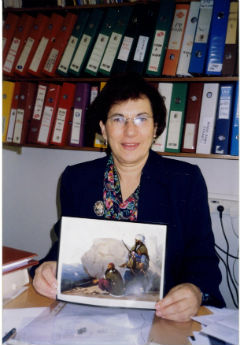 (Author photo) Today, new researchers have collected additional verification of the stated theory. One of them is Shalva Weil, Professor of Anthropology at Hebrew University in Jerusalem, who wrote the book "Beyond the Sambatyon: The Myth of the Ten Lost Tribes”. (Author photo) Today, new researchers have collected additional verification of the stated theory. One of them is Shalva Weil, Professor of Anthropology at Hebrew University in Jerusalem, who wrote the book "Beyond the Sambatyon: The Myth of the Ten Lost Tribes”. In her youth, Shalva read that the Sambatyon river, mentioned in the Talmud, still flows today somewhere in the east. Since then the riddle of the Lost Tribes of Israel conquered her mind. Having studied numerous manuscripts of travelers during the Middle Ages and the nineteenth century, Weil found the place where the mythical river could be located. It is the same Southeast Afghanistan, the north of Pakistan and Kashmir. In 1991, Shalva Weil shocked the world by presenting her findings at her exhibition in the Museum of Jewish Diaspora in Tel Aviv. The exhibition named Beyond the Sambatyon river - a myth about the Lost Tribes has drawn attention from both Israeli and Western media, including CNN. In her recollection of the response to the exhibition she noted in interview with me in Hebrew University in Jerusalem: "I designed the exposition so that a visitor feels as though he crosses the water flow symbolizing the legendary Sambatyon river. The water illuminated by a projector light expels "rocks" and separates the external world from the world populated by Israelis. Here, in this "world”, visitors found numerous evidences, that descendants of the Israeli Kingdom not only exist, but also remember their Jewish roots and are proud of them". Weil spent a lot of time among Pashtuns in Kashmir. She wrote that Traditions in Pashtun families have roots of Jewish origin. Some Pashtuns wear amulets with words "Shema Israel” written on them. They circumcise male children on the eighth day after their birth. Women observe the rituals of purification described in the Torah and light candles on Friday night. Men have side curls and wear special garments on their heads which is similar to the Jewish talit during prayer. None of the other tribes in the region wear similar head-dresses. "When in Kabul, I arrived at one of the villages of the Afridi tribes late on Friday afternoon. I stayed with a Muslim family, but imagine my surprise when they lit candles and hit them in a corner – a relic of an ancient custom; so they described it, but they were unable to explain the reason for it, - she wrote in her article "Pathan Puzzle”. – In the evening they served grape juice to the members of the household. By Islamic law, it is forbidden to drink of the vine, but they have an ancient tradition which must be preserved”. In other places Shalva Weil has found strong proofs from local leaders about their origin. She recollected how in one of the villages of Kashmir at the bottom of the Himalayas the leader of a local clan Yoosoof Zyes (Sons of Joseph) told her, that his tribe was descended from "Ibn-Yacob” ("Son Jacob"). To the question "who was Jacob”, he looked at the sky as if asking for forgiveness, and then answered: "Jacob was Israel. And we are "Bani-Israel, sons of Israel". According to Weil, well-educated Afghans with western educations do not consider this a fairy tale, and speak about the Afghan origin from Jews as something established. During her conversation with a group of Pashtun students from the Delhi University they reluctantly recognized that their tribes originate from "Bani-Israel". At the same time they were militant anti-Zionists and did not identify themselves with Israel in the slightest. Obvious Weil, like many other researches, believes that the traditional names among these tribes, are derivative from Jewish names: The Rabbani Tribe is really Reuben, the Shinware Tribe is Simeon, the Lewani Tribe is Levi, The Daftani Tribe is Naphtali, and the Jaji Tribe is Gad, and the Ashuri Tribe is Asher, The Yusefsai Tribe is children of Joseph, and the Afridi Tribe is really Ephraim. Rabbi Eliyahu Avichail: Hebrew amulets, hallot and Shield of David Rabbi Eliyahu Avichail (Author photo) 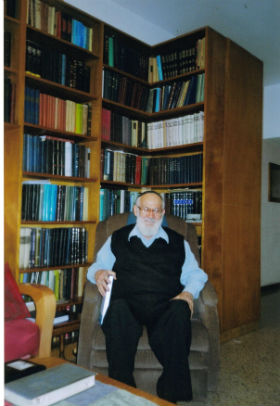 Rabbi Eliyahu Avichail devoted himself to finding the Lost Tribes, created the organization Amishav and traveled around the world in his search. Rabbi Avichail also mentioned convincing facts of their existence. In his book "The Tribes of Israel” Avichail told about numerous and surprising discoveries made by him. Rabbi Eliyahu Avichail devoted himself to finding the Lost Tribes, created the organization Amishav and traveled around the world in his search. Rabbi Avichail also mentioned convincing facts of their existence. In his book "The Tribes of Israel” Avichail told about numerous and surprising discoveries made by him. "Many testimonies tell of the popular custom of wearing a Talit, which the Pathans call "Joy-Namaz” ("place of worship” in Afghani). The Sabbath is considered a day of reat, and there are testimonies of abstention from labor, cooking, and baking. They prepare 12 "hallot” (traditional bread) in honor of the Sabbath, as was done in the ancient Temple. Pahtans do not eat horse or camel meat. There is some evidence of their not eating meat and milk which was cooked together. They also have a tradition regarding the differentiation between pure and impure birds”. Rabbi Eliyahu Avichail continued: "One testimony tells of a man of the tribe of Lewani who came to the Jewish synagogue on Yom Kippur of every year. He would stay there until sundown without uttering a word. He spoke of the tradition of the Temple on this day and of the High Priest and his work there. One year he erred in his calendar and didn’t come, and he wept bitterly”. According to Avichail, with whom I spoke in his house in Jerusalem, Pathans had a custom similar to the Biblical sending out of a scapegoat to atone for sins. ”Among the Pathans are found Hebrew names such as Israel and Samuel. These are not found among the Moslems. There are a few testimonies of the use of amulets written in Hebrew and Hebrew script languages. Some contained the phrase "Here O Israel”. The amulet is secretly written by the head of the tribe, and it is forbidden to open it. One interesting testimony relates the placing of a wrapped book of Psalms under the pillow of the sick in order to heal him. The symbol Shield of David is found in almost every Pathan house in the Peshawar area. The Pathan, like the other Moslem, usually pray in Mosques. Some, however, pray towards Jerusalem. There is also a stone written in ancient Hebrew in the Museum Dar-El-Aman in the capital of Kabul, which indicates a Jewish pat to the region, and the presence of Jews for at least 1500 years. In Minerjam, in the centre of Afganistan, there is a large Shield of David etched in stone. In Tchastovi there is a school with a Shield of David”. They used easy wine on Friday. They recognized, that were Moslems, but with the certain clause", - it told. Many Pathans don’t conceal their descent. For example Emir Abdul Rahman, the grandfather of the former Afghan Shah Amanullah, stated expressly in his History of the Afghans that the Afghans were of Israelite descent. The previous chief rabbi of the Jewish community in Heart, Rabbi Abraham Cohen asserted that he personally heard the King of Afghanistan saying that he belonged to the Lost Tribes. Christ died in... Kashmir? It is interesting, that the Indian researchers come to the same conclusions, as their Jewish and Western colleagues. Former Director of the Institute of Archaeology of Kashmir Professor Fida Hassanal, wrote that during his travels around the state he discovered a striking phenomenon. The peasants of some Pashtun villages, as orthodox Muslims, believe that they come from Jews who were sent onto slavery and name themselves Bani Israel. "Being fascinated by this story, I traveled to Gandarbal about 20 kilometers north of Srinagar on the way to Sonmarg. The road leading to the right from Gandarbal brought us to this beautiful village of Gutlibagh… The head of the village, Mir Alam Naqashbandi, nearly 90 years old. Robist and tall, formerly a member of the Kashmir assembly and his kinsmen welcomed us. I asked him to tell us history of his people. He said he was not well and found it difficult to speak. But seeing our disappointment, narrated the story of Jacob and his twelve sons. He mentioned that his group though Muslim, were descendants of the tribe of Judah. I asked him as to how many of his people were settled in and around Gutlibagh. "All over Kashmir, - was his replay”. In an early interview Ex-Director of Archeology Fida Hasnain from Kashmir Mir Alam had stated "we were Buddhists, and before that we were Bani Israel”. It is curious that there is the widespread belief in Kashmir that Jesus Christ ended his life here.... According to popular belief in Kashmir, Christ didn’t die on a cross, but was rescued by his adherents and was secretly delivered to Kashmir where up to the end of his days, he preached his teaching. But most curious in this legend, is that Christ came to Kashmir not by accident but with the goal to preach among the Lost Tribes of Israel. The book of A.Faber-Kaiser "Jesus died in Kashmir” was devoted to this myth. Rabbi Eliyahu Avichail wrote: "In Yusmarg (Handwara), which on the border of Pakistan. There lives a group which to this day calls itself by the name "B’nei Yisrael”. Many of the inhabitants of Kashmir say, however, that this was the ancient name of all of the inhabitants of Kashmir”. He pointed out surprising coincidences in names of some places with names in ancient Israel, - for example: Samaryah (Zanskar) – Samaria, Pishgah (Handwara) – Pisgah, Bushan (Pamir) – Bashan, Guzana – Gozan and so on. According to Rabbi Eliyahu Avichail, "there is yet another tradition in connection with King Solomon, according to which King Solomon reached the Kashmir valley, and, through his wisdom, aided the people of Kashmir by successfully regulating the "Jalum” River. This tradition is also connected to the name of a place "Tachat-I-Suleiman” – meaning Solomon’s Throne, which is situated above Srinagar, the capital of Kashmir. …The two primary historians of Kashmir, Mulla Nadiri, who wrote "Tarikh-I-Kashmir” ("The History of Kashmir”), and Mulla Achmad, who wrote "Waki-I-Kashmir” ("Events of Kashmir”) have established, without a trace of a doubt that the origin of the Kashmiris are to be found in the People of Israel”. Dr. Navras Jaat Aafreedi: nonrandom coincidences Navras Aafreedi in Old City, Jerusalem
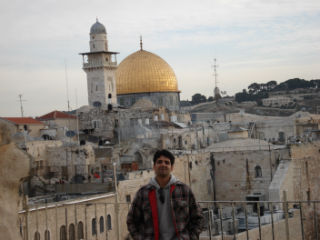 The newest researches confirm the version about an origin Pashtun from the Lost Tribes. The Indian researcher and the historian Dr. Navras Jaat Aafreedi, in particular, is convinced of this hypothesis. The newest researches confirm the version about an origin Pashtun from the Lost Tribes. The Indian researcher and the historian Dr. Navras Jaat Aafreedi, in particular, is convinced of this hypothesis. Navras Aafreedi is an Indian citizen, a representative of the Afridi tribe, and a historian. Before his 30th birthday Aafreedi made a Ph.D. on Medieval & Modern Indian History. His research topic was: "The Indian Jewry and the Self-Professed ‘Lost Tribes of Israel’ in India”. His book of the same title is the third serious major work by a Gentile on this subject. He did his Post-Doctoral Research at Tel Aviv University. In an interview with me in the American Institute for the Study of Jewish tradition in Jerusalem Navraz talked about the path that led him, a Muslims and a Pashtuns, to the subject of the Lost Tribes of Israel. He said me follow: "Small minorities and marginal groups in all parts of the world interested me. But I was always more interested in Jews than any other group because of their impressive accomplishments and achievements, in spite of their numerical insignificance, and also because Muslims in my home town Lucknow tended to blame Jews for everything evil in the world. My interest in the Jews further deepened when my late uncle once said to me that our roots were Israelite. I was then 12 years old. Right then I decided that I would explore my probable Israelite roots when I get to the doctoral level. There were no Jews in my home town Lucknow. I met Jews for the first time only when I started researching for my Ph.D. But the more I read about Jews the more my admiration grew for them. The Jewish saga is a tale of unprecedented heroism and self-sacrifice, Jews were humiliated and mistreated like no other people in history. That despite all this, the Jews rose and returned to their ancient homeland (Israel) after two thousand years, speaks volumes about the character of these tenacious people. I admire Jews as much for their resilience and courage as for their wisdom and scholarship. My thesis entitled The Indian Jewry and the Self-Professed 'Lost Tribes of Israel' in India earned me the degree of Ph.D. from Lucknow University in 2005. After that I won scholarships from the Centre for Judaic Studies, Shandong University, China and the Israeli Government”. Chinese scholarship, according to Navras, covered the travel expenses and was for two years while the Israeli scholarship did not cover the travel expenses and was for a period of one year only. "But I a chose the Israeli scholarship for my love for Israel”, - he said. Navras began his research of the connection between Afridi Pathans/Pakhtuns from Malihabad in Lucknow district (state Uttar Pradesh) and the Ephraim tribe. Pakhtuns settled here in the mid XVIII century and they are about 1200 today. It is a drop in the ocean compared to about 45 million Pashtuns of the world. Pathans/Pakhtuns/Pashtuns mainly live in the highlands of Afghanistan and Pakistan and are divided into 60 tribes and 400 clans. Afridi tribe is one of the largest (about three million) and very martial. They controlled the famous Khyber and the Kohat passes, collected tribute from caravans and became famous for their fearlessness and selflessness in the battles with everyone who tried to conquer Afghanistan: from Mughal troops in the XVI and XVII centuries to Britons in the XIX and Russians in the XX century. Navras Aafreedi and author
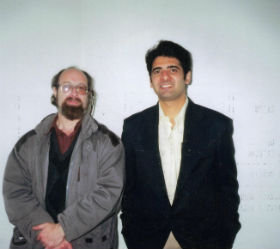 For hundreds of years Afridis have called themselves Bani Israel (Pushto for the Hebrew B'nei Yisrael meaning Children of Israel) and believe that they originated from the Ephraim tribe. Lately, the hatred of Jews in the Islamic world made the young generation of Pashtuns give up their beliefs. But Navras quotes a number of Jewish immigrants from Afghanistan who testify to the prevalence of many Jewish rituals and customs among the Afridi Pathans, e.g., the lighting of candles on Shabbat, keeping long side locks, wearing shawls resembling the tallith, circumcision on the eighth day after birth, and Levirate. For hundreds of years Afridis have called themselves Bani Israel (Pushto for the Hebrew B'nei Yisrael meaning Children of Israel) and believe that they originated from the Ephraim tribe. Lately, the hatred of Jews in the Islamic world made the young generation of Pashtuns give up their beliefs. But Navras quotes a number of Jewish immigrants from Afghanistan who testify to the prevalence of many Jewish rituals and customs among the Afridi Pathans, e.g., the lighting of candles on Shabbat, keeping long side locks, wearing shawls resembling the tallith, circumcision on the eighth day after birth, and Levirate. Navras has gone further than all previous researchers in the field, and has made an attempt to prove the Jewish origin of Pushtun, based not only on history, but also on biology. Together with Prof. Tudor Parfitt (SOAS, London University) and Dr. Yulia Egorova (Cardiff University) Navras collected DNA samples of 50 paternally unrelated Afridi males of Malihabad and they are now being analyzed at University College London. Navras sees deep meaning in the fact that the world’s only Muslim who teaches Jewish theology at a western university happens to be an Afridi Pathan. She is Prof. Mehnaz Mona Afridi of the Department of Theological Studies, Loyola Marymount University in Los Angeles. And the only Muslim in the world, who has initiated a Jewish-Muslim dialogue with Daniel Pearl's father Judea Pearl, happens to be a Pathan, Prof. Akbar S. Ahmad. And isn't it amazing that he, Navras Jaat Aafreedi, himself was from the very childhood so strongly drawn to Jews, absolutely unfamiliar and alien to him? It can be a peculiar proof too, my interlocutor smiles. And how explain an extraordinary event in the Jewish community of India in 1967 when the President of India Dr. Zakir Hussain made a highly surprising visit to the Ohel David Synagogue of Pune, Maharashtra, which was celebrating its centenary. The significance of the event and the title of the guest were incommensurable and caused a lot of surprise. Why? Dr. Zakir Hussain, one of the most famous sons of India, honored with the India's highest civilian award, the Bharat Ratna, was a member of a Pathan/Pakhtun/Pashtun tribe – the Afridi, said Navras. Would the time for repatriation of bellicose and unruly Afridi to Israel ever come? "Not today, and not tomorrow, but it is possible. During his recent trip to London, Rabbi Eliyahu Avichail met two Afridi Pathan families who had fled their country during the Soviet invasion of Afghanistan. They spoke about their desire to embrace Judaism, the faith of their supposed ancestors…” he says. | |
| Просмотров: 7450 | Загрузок: 0 | Комментарии: 1 | Рейтинг: 0.0/0 | |
| Всего комментариев: 0 | |
